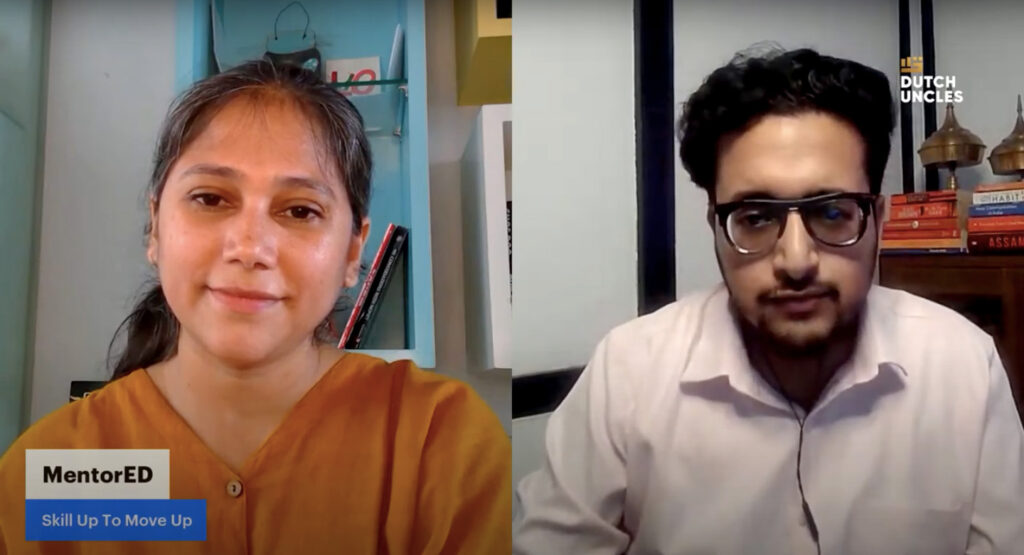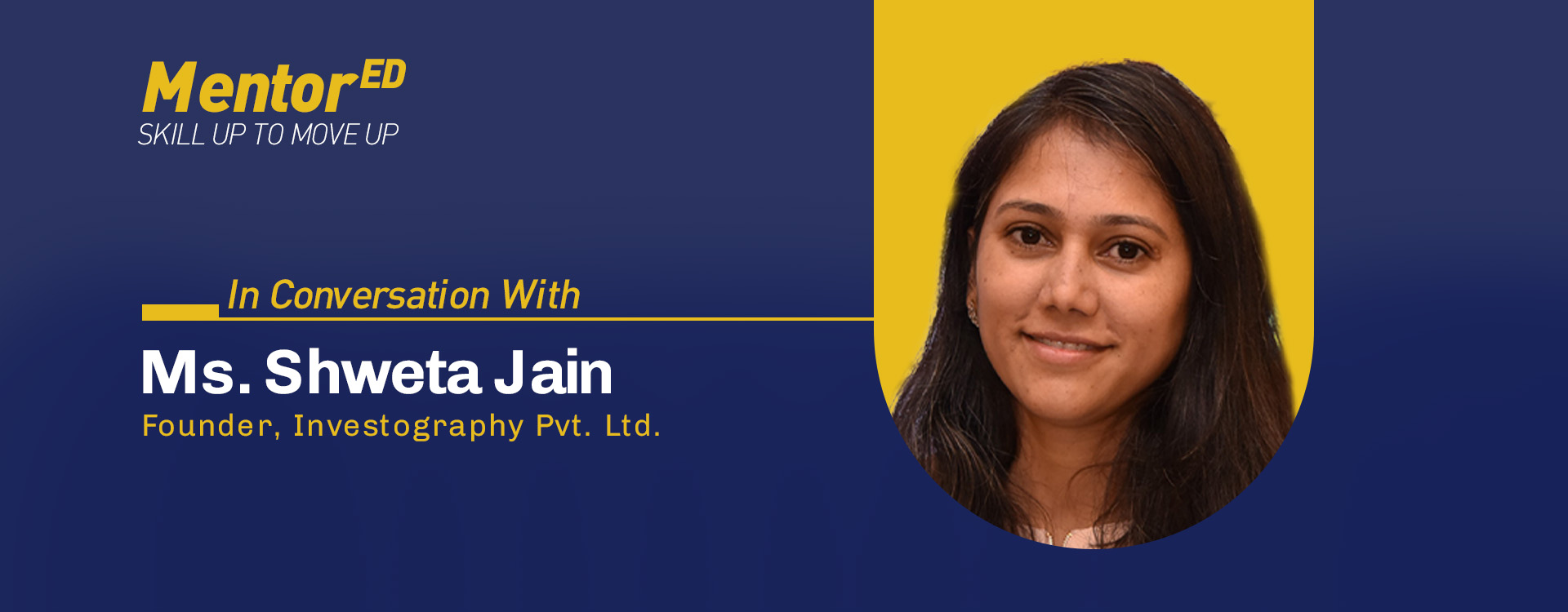Millennials who have their entire life in front of them, usually have the zeal of being independent, setting on their own financial choices, and so forth. In the fervour, many young investors miss out on managing bad choices. In the present economic situation, inflation erodes the value of your money over a stretch of time if it is not invested wisely. Having said that, it is usually a dilemma for investors to choose the right financial window and get started with their money making process. This is where we need to acquaint ourselves with wise money management and investment practices that will help an individual to set a firm foundation for a smooth financial future.
In the recent episode of MentorED – a LIVE Workshop Series by Dutch Uncles, the esteemed speaker, Ms. Shweta Jain enlightened the audience who joined LIVE from across four platforms – LinkedIn, YouTube, Twitter, and Facebook – about the good money habits to start our investment journey with and shared some money management strategies as well. Ms. Shweta Jain, Author and Founder of Investography Pvt. Ltd. is a Certified Financial Planner who shares a passion for providing financial literacy to new and existing investors. With an experience of more than 16 years in the financial planning, research, and client services arena, Ms. Jain has conducted 1000+ workshops for more than 35,000 individuals and advisors for corporations like Google, HP, Accenture, JP Morgan, JC Penney, HPCL, etc.
In brief the session had the following takeaways:
- Saving versus Investing – How inflation impacts portfolios
- Insurance – How it is treated as a stepchild
- Starting early versus starting late
- How compounding works and why don’t we make money on our money
‘‘
Do not save what is left after spending, but spend what is left after saving
- Warren Buffett
Good Money Habits
What do you answer when someone asks you about your well-being? We generally say we are fine or we are doing okay or not so good, if we have any problems, right? Similarly, being financially well is equally important and one should not hide or shy away from seeking help. The foundation for being financially well comes with habits. A habit is something that makes or breaks your future. So when it comes to financial matters everything boils down to what you want out of life and what are the milestones you want to achieve.
Elaborating the concept of having good financial habits, Ms. Jain further mentioned in the session about the meaning of being financially independent, how insurance can be a gateway to a safer life, clarity regarding the savings and investments and the basic good habits that one should follow. Talking about financial independence, Ms. Jain gave few examples about what financial freedom meant to different people. It was surprising to know that everybody might have invested in the same stock but what they want out of those investments is different. This is because when we assign meanings to all these investments, the time frame is clear and one can map out their journey correctly. Once you know what financial independence means to you, you will automatically come to know what to do with your money.
Coming to the topic of insurance, it is divided into three categories: Life insurance, Health insurance, and Critical insurance. Ms. Jain claimed that insurance is her top most priority as it protects not only the individual but also their loved ones. The risks here are totally different from the risks in equity. Life insurance gives you the promise of protecting your family when you are not around anymore. Basically, if you have a sum of money today, your life or your family’s future is protected. If you are hospitalised you get health insurance and if you are recovering from a life threatening illness, a critical illness policy will help you sail through that time.
Having said that, what exactly should be the good habits that an investor should follow? Well, for that Ms. Jain mapped out a basic flowchart explaining how evaluating your insurance cover, evaluating loans is important and should be done periodically. One needs to save for their goals first and postpone spending in order to gain wealth and allocate their assets according to their risk taking capacity. She said, “when you look at your investment, do you want to eat better or do you want to sleep better”, if you want to sleep better then you should invest in safer assets and if you want to eat well, you will have to beat inflation and go for growth assets like equity.
Audience Asks
From my understanding, there’s no right time to invest but can you list some reasons as to why one should start investing early and what all financial options will be beneficial for millennials like us?
Ms. Jain answered this question by giving a personal example of how she started spending more, unconsciously, while owning a credit card. Eventually swiping her credit card became a habit, in her words, “a habit that I want to break”. Ms. Jain explained that there is no right time to invest and it is intertwined with your goals and aspirations. Talking about the beneficial aspect of investment, she said, if you have long term, high aspirations, then you should invest in equity. It is based on choices, whether you want to play safe and invest your entire money at once, for a long term goal, or if you want to take that risk and keep investing in small amounts on a monthly basis to reach that goal. Ms. Jain advised not to fall into the trap of FDs, rather start investing in equity, and be consistent.
I wanted to know something about SIP, which is more profitable – short term or long term, because I have seen people withdraw their money when there is a downward trend in the market.
Ms. Jain chuckled while answering this question and talked about the basic human nature of following a herd. She said, “Although it seems much safer, don’t follow the herd and do what is right for you”. Ideally SIPs in the long term are much more profitable but it is something that should be towards a goal. So if you have a short-term goal, there is nothing stopping you from investing in SIP, for that duration of time. Ms. Jain gave an answer related to her life, about how she is doing SIPs for her son’s school fees, which is a short term goal and for the long term, she is saving for her retirement as well. So it does not have to be an either-or decision, rather it has to be both and has to be oriented towards your goals. Long term SIPs are more profitable but a short term SIP is more beneficial.

I guess, price rise of essential commodities is affecting all of us in the country. How can we make a smart investment considering the circumstances?
Price rise of commodities is what inflation is, infact, the reported inflation and the inflation that we see will be different. For example, healthcare and education inflation are all in double digits. So this means that our portfolios should be giving us double digit returns so that we live well, otherwise, we will be spending more and consuming less. And the only investment option for this is equity, whether it’s equity mutual fund, PMS, direct stocks or portfolios, this is the only asset class that will give you good returns in the long term. Investment in equity is like investment in business and not just “stock tickers”. Whether you are running your own business or are an employee, you can invest in the best businesses by investing in their stocks.
Give your money a chance to grow
Everything in financial planning or life is a trade off, so you need to figure out whether you want a vacation, which is a short term goal, or should you put that money aside for your retirement, which is a long term goal. More often we are focused on how much our equity portfolio has given us rather than how much we have spent on our portfolios. So make sure that you are allocating your assets correctly according to your requirements and do not push your equity to over-perform because with higher returns usually comes the need of taking higher risks. Investment is the journey that you need to learn on and nobody else can do it for you.




